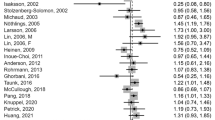Abstract
Purpose
Although there is convincing evidence that red and processed meat intake increases the risk of colorectal cancer (CRC), the potential role of meat cooking practices has not been established yet and could partly explain the current heterogeneity of results among studies. Therefore, we aimed to investigate the association between meat consumption and cooking practices and the risk of CRC in a population-based case–control study.
Methods
A total of 1671 CRC cases and 3095 controls recruited in Spain between September 2008 and December 2013 completing a food frequency questionnaire with a meat-specific module were included in the analyses. Odds ratios (OR) and confidence intervals (CI) were estimated by logistic regression models adjusted for known confounders.
Results
Total meat intake was associated with increased risk of CRC (OR T3–T1 1.41; 95% CI 1.19–1.67; p trend < 0.001), and similar associations were found for white, red and processed/cured/organ meat. Rare-cooked meat preference was associated with low risk of CRC in red meat (ORrare vs. medium 0.66; 95% CI 0.51–0.85) and total meat (ORrare vs. medium 0.56; 95% CI 0.37–0.86) consumers, these associations being stronger in women than in men. Griddle-grilled/barbecued meat was associated with an increased CRC risk (total meat: OR 1.45; 95% CI 1.13–1.87). Stewing (OR 1.25; 95% CI 1.04–1.51) and oven-baking (OR 1.18; 95% CI 1.00–1.40) were associated with increased CRC risk of white, but not red, meat.
Conclusions
Our study supports an association of white, red, processed/cured/organ and total meat intake with an increased risk of CRC. Moreover, our study showed that cooking practices can modulate such risk.
Similar content being viewed by others
References
Ferlay J, Soerjomataram I, Ervik M, Dikshit R, Eser S, Mathers C, Rebelo M, Parkin DM, Forman D, Bray F (2013) GLOBOCAN 2012 v1.0, Cancer Incidence and Mortality Worldwide: IARC CancerBase No. 11. International Agency for Research on Cancer, Lyon. Available from: http://globocan.iarc.fr (last accessed May 6th 2015)
Ferlay J, Steliarova-Foucher E, Lortet-Tieulent J, Rosso S, Coebergh JWW, Comber H, Forman D, Bray F (2013) Cancer incidence and mortality patterns in Europe: estimates for 40 countries in 2012. Eur J Cancer 49:1374–1403
Spanish Interactive Epidemiological Information System (ARIADNA). http://ariadna.cne.isciii.es (last accessed January 27th 2016)
World Cancer Research Fund/American Institute for Cancer Research (2011) Continuous Update Project Report Summary. Food, Nutrition, Physical Activity, and the prevention of Colorectal Cancer
Carr PR, Walter V, Brenner H, Hoffmeister M (2016) Meat subtypes and their association with colorectal cancer: systematic review and meta-analysis. Int J Cancer 138:293–302
Abid Z, Cross AJ, Sinha R (2014) Meat, dairy, and cancer. Am J Clin Nutr 100:386s–393s
Chan DS, Lau R, Aune D, Vieira R, Greenwood DC, Kampman E, Norat T (2011) Red and processed meat and colorectal cancer incidence: meta-analysis of prospective studies. PLoS ONE 6:e20456
Alexander DD, Weed DL, Cushing CA, Lowe KA (2011) Meta-analysis of prospective studies of red meat consumption and colorectal cancer. Eur J Cancer Prev 20:293–307
Alexander DD, Miller AJ, Cushing CA, Lowe KA (2010) Processed meat and colorectal cancer: a quantitative review of prospective epidemiologic studies. Eur J Cancer Prev 19:328–341
Bouvard V, Loomis D, Guyton KZ, Grosse Y, Ghissassi FE, Benbrahim-Tallaa L, Guha N, Mattock H, Straif K, International Agency for Research on Cancer Monograph Working Group (2015) Carcinogenicity of consumption of red and processed meat. Lancet Oncol 16:1599–1600
Cross AJ, Sinha R (2004) Meat-related mutagens/carcinogens in the etiology of colorectal cancer. Environ Mol Mutagen 44:44–55
Bastide NM, Pierre FH, Corpet DE (2011) Heme iron from meat and risk of colorectal cancer: a meta-analysis and a review of the mechanisms involved. Cancer Prev Res 4:177–184
Joosen AM, Kuhnle GG, Aspinall SM, Barrow TM, Lecommandeur E, Azqueta A, Collins AR, Bingham SA (2009) Effect of processed and red meat on endogenous nitrosation and DNA damage. Carcinogenesis 30:1402–1407
Jamin EL, Riu A, Douki T, Debrauwer L, Cravedi JP, Zalko D, Audebert M (2013) Combined genotoxic effects of a polycyclic aromatic hydrocarbon (B(a)P) and an heterocyclic amine (PhIP) in relation to colorectal carcinogenesis. PLoS ONE 8:e58591
Di Maso M, Talamini R, Bosetti C, Montella M, Zucchetto A, Libra M, Negri E, Levi F, La Vecchia C, Franceschi S, Serraino D, Polesel J (2013) Red meat and cancer risk in a network of case-control studies focusing on cooking practices. Ann Oncol 24(12):3107–3112
Parr CL, Hjartåker A, Lund E, Veierød MB (2013) Meat intake, cooking methods and risk of proximal colon, distal colon and rectal cancer: the Norwegian Women and Cancer (NOWAC) cohort study. Int J Cancer 133:1153–1163
Miller PE, Lazarus P, Lesko SM, Cross AJ, Sinha R, Laio J, Zhu J, Harper G, Muscat JE, Hartman TJ (2013) Meat-related compounds and colorectal cancer risk by anatomical subsite. Nutr Cancer 65(2):202–226
Tabatabaei SM, Fritschi L, Knuiman MW, Boyle T, Iacopetta BJ, Platell C, Heyworth JS (2011) Meat consumption and cooking practices and the risk of colorectal cancer. Eur J Clin Nutr 65:668–675
Navarro A, Muñoz SE, Lantieri MJ, del Pilar Diaz M, Cristaldo PE, de Fabro SP, Eynard AR (2004) Meat cooking habits and risk of colorectal cancer in Córdoba, Argentina. Nutrition 20:873–877
Murtaugh MA, Ma KN, Sweeney C, Caan BJ, Slattery ML (2004) Meat consumption patterns and preparation, genetic variants of metabolic enzymes, and their association with rectal cancer in men and women. J Nutr 134:776–784
Muscat JE, Wynder EL (1994) The consumption of well-done red meat and the risk of colorectal cancer. Am J Public Health 84(5):856–858
Gerhardsson de Verdier M, Hagman U, Peters RK, Steineck G, Overvik E (1991) Meat, cooking methods and colorectal cancer: a case-referent study in Stockholm. Int J Cancer 49:520–525
Joshi AD, Kim A, Lewinger JP, Ulrich CM, Potter JD, Cotterchio M, Le Marchand L, Stern MC (2015) Meat intake, cooking methods, dietary carcinogens, and colorectal cancer risk: findings from the Colorectal Cancer Family Registry. Cancer Med 4(6):936–952
Castaño-Vinyals G, Aragonés N, Pérez-Gómez B, Martín V, Llorca J, Moreno V, Altzibar JM, Ardanaz E, de Sanjosé S, Jiménez-Moleón JJ, Tardón A, Alguacil J, Peiró R, Marcos-Gragera R, Navarro C, Pollán M, Kogevinas M, MCC-Spain Study Group (2015) Population-based multicase-control study in common tumors in Spain (MCC-Spain): rationale and study design. Gac Sanit 29(4):308–315
García-Closas R, García-Closas M, Kogevinas M, Malats N, Silverman D, Serra C, Tardón A, Carrato A, Castaño-Vinyals G, Dosemeci M, Moore L, Rothman N, Sinha R (2007) Food, nutrient and heterocyclic amine intake and the risk of bladder cancer. Eur J Cancer 43:1731–1740
CESNID (2008) Tablas de composición de alimentos CESNID. Taules de composició dels aliments CESNID. Ediciones de la Universitat de Barcelona, McGraw Hill-Interamericana de España SA, Barcelona
Calvert C, Cade J, Barrett JH, Woodhouse A, UKWCS Steering Group (1997) Using crosscheck questions to address the problem of mis-reporting of specific food groups on Food Frequency Questionnaires. Eur J Clin Nutr 51:708–712
Nothlings U, Hoffmann K, Boeing H (2002) Do cross-check questions improve food frequency questionnaire data?. IARC Scientific Publications, IARC Press, Lyon
Mendez MA, Popkin BM, Buckland G, Schroder H, Amiano P, Barricarte A, Huerta JM, Quirós JR, Sánchez MJ, González CA (2011) Alternative methods of accounting for underreporting and overreporting when measuring dietary intake-obesity relations. Am J Epidemiol 173:448–458
Hosmer DW, Lemeshow S (1989) Applied logistic regression. Wiley, New York
Ollberding NJ, Wilkens LR, Henderson BE, Kolonel LN, Le Marchand L (2012) Meat consumption, heterocyclic amines and colorectal cancer risk: the Multiethnic Cohort Study. Int J Cancer 131(7):e1125–e1133
Larsson SC, Wolk A (2006) Meat consumption and risk of colorectal cancer: a meta-analysis of prospective studies. Int J Cancer 119(11):2657–2664
Shi Y, Yu PW, Zeng DZ (2015) Dose-response meta-analysis of poultry intake and colorectal cancer incidence and mortality. Eur J Nutr 54(2):243–250
Wang J, Joshi AD, Corral R, Siegmund KD, Marchand LL, Martinez ME, Haile RW, Ahnen DJ, Sandler RS, Lance P, Stern MC (2012) Carcinogen metabolism genes, red meat and poultry intake, and colorectal cancer risk. Int J Cancer 130(8):1898–1907
Guallar-Castillón P, Rodríguez-Artalejo F, Lopez-Garcia E, León-Muñoz LM, Amiano P, Ardanaz E, Arriola L, Barricarte A, Buckland G, Chirlaque MD, Dorronsoro M, Huerta JM, Larrañaga N, Marin P, Martínez C, Molina E, Navarro C, Quirós JR, Rodríguez L, Sanchez MJ, González CA, Moreno-Iribas C (2012) Consumption of fried foods and risk of coronary heart disease: Spanish cohort of the European Prospective Investigation into Cancer and Nutrition study. BMJ 344:e363
Bastide NM, Chenni F, Audebert M, Santarelli RL, Taché S, Naud N, Baradat M, Jouanin I, Surya R, Hobbs DA, Kuhnle GG, Raymond-Letron I, Gueraud F, Corpet DE, Pierre FH (2015) A central role for heme iron in colon carcinogenesis associated with red meat intake. Cancer Res 75(5):870–879
Humphreys KJ, Conlon MA, Young GP, Topping DL, Hu Y, Winter JM, Bird AR, Cobiac L, Kennedy NA, Michael MZ, Le Leu RK (2014) Dietary manipulation of oncogenic microRNA expression in human rectal mucosa: a randomized trial. Cancer Prev Res 7(8):786–795
Zur Hausen H (2012) Red meat consumption and cancer: reasons to suspect involvement of bovine infectious factors in colorectal cancer. Int J Cancer 130:2475–2483
Acknowledgements
The study was partially funded by the “Accion Transversal del Cancer”, approved on the Spanish Ministry Council on 11 October 2007, by the Instituto de Salud Carlos III-FEDER (PI08/1770, PI08/0533, PI08/1359, PS09/00773, PS09/01286, PS09/01903, PS09/02078, PS09/01662, PI11/01403, PI11/01889, PI11/00226, PI11/01810, PI11/02213, PI12/00488, PI12/00265, PI12/01270, PI12/00715, PI12/00150), by the Fundación Marqués de Valdecilla (API 10/09), by the ICGC International Cancer Genome Consortium CLL, by the Junta de Castilla y León (LE22A10-2), by the Consejería de Salud of the Junta de Andalucía (PI-0571), by the Conselleria de Sanitat of the Generalitat Valenciana (AP 061/10), by the Recercaixa (2010ACUP 00310), by the Regional Government of the Basque Country, by European Commission grants FOOD-CT-2006-036224-HIWATE, by the Spanish Association Against Cancer (AECC) Scientific Foundation, by the Catalan Government DURSI grant 2009SGR1489. Jordi de Batlle acknowledges the support of the European Commission FP7 Marie Curie Actions-People, Cofunding of regional, national, and international programs (COFUND).
Author information
Authors and Affiliations
Corresponding author
Ethics declarations
Conflict of interest
The authors declare that they have no conflict of interest.
Ethical standards
All participants signed an informed consent prior to their inclusion in the study. The study has been approved by the ethics committees of all participating centres and has therefore been performed in accordance with the ethical standards laid down in the 1964 Declaration of Helsinki and its later amendments.
Electronic supplementary material
Below is the link to the electronic supplementary material.
Rights and permissions
About this article
Cite this article
de Batlle, J., Gracia-Lavedan, E., Romaguera, D. et al. Meat intake, cooking methods and doneness and risk of colorectal tumours in the Spanish multicase-control study (MCC-Spain). Eur J Nutr 57, 643–653 (2018). https://doi.org/10.1007/s00394-016-1350-6
Received:
Accepted:
Published:
Issue Date:
DOI: https://doi.org/10.1007/s00394-016-1350-6




